#that's how they talked about christians historically though!
Text
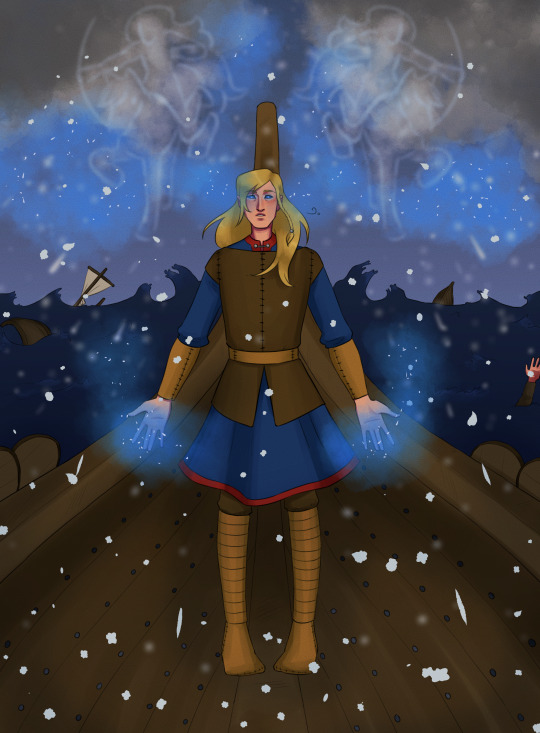
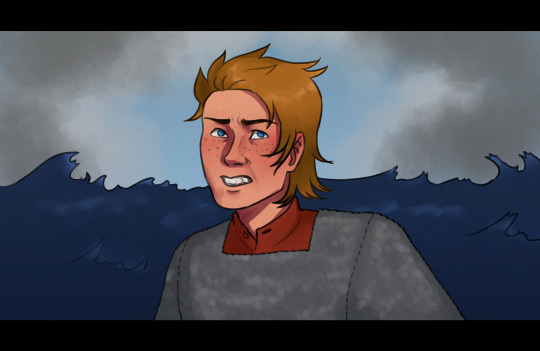
The Battle of Hjørungavåg - for the Mythtalia March by @hwsevents
-
"Never have Danes held such a battle with Norwegians, not before nor since" - Fagrskinna.
-
The battle of Hjørungavåg took place outside the Norwegian coast in the year 986, and was a sea battle between an invading Danish army and a defending Norwegian one. It was a battle of great national significance as the ruling Earl Håkon defended the country against the Danish King Svein Tjugeskjegg aided by the Joms Vikings, who wanted to take control over Norway and christen it.
The battle begun after some farmers tricked the Danes into believeing Earl Håkon only had 2-3 ships with him. They charged forth and got surprised by 50 ships lying in wait for them.
It was a fierce battle, and despite the element of surprise, the Norwegians suffered heavy losses early on. Most of the losses were with Earl Håkon, who fought against Svein Tjugeskjegg, a fight so intense that he had to shed his chainmail as it had become torn apart by all the weapons hitting him. Håkon's sons Eirik and Svein Håkonson fought against the Joms Vikings, Eirik saving his brother. This is when the battle turns.
Suddenly, a terrifying storm hits, with fierce waves of hail. The storm seemed almost magic and supernatural, and on the side of the Norwegians. Had the pagans used dark magic? It is said that Earl Håkon had sacrificed his 7 year old son Erling in a ritual for victory (probably false). The Earls of Lade had a connection to the female godess and spirit Torgerd Hølgebrud, who was called on whenever the family was in need. She came along with her sister and other valkyries on horses with bows and arrows, sending hail towards their enemies.
Torgerd is interpreted as an ancient fertility spirit, and these spirits are also connected with a warrior aspect. They protected certain families and are some of the oldest creatures in the pre-Christian Norse religion.
The supernatural warrior spirits was a convenient excuse for why Svein Tjugeskjegg fled the battle; it was impossible to fight against gods and trolls. It also supported the savage ways of the pagan religion.
As Svein flees, he leaves the Joms Vikings behind to be captured by the Earls. They were about to be executed by beheading, but one of them managed to get a hold of the sword and chop the head off the man about to kill him. Eirik Håkonson is impressed by this and grants them their freedom.
#mythtalia march#hetalia#historical hetalia#aph norway#aph denmark#hws norway#hws denmark#again; any excuse to talk about Eirik Jarl - my fave historical person 🥰🥰🥰#more historical notes: the son Erling was probably older and fought along his family in the battle - not sacrificed for victory#and as most sources are mostly christian propaganda it is clear that the respect they had for the Earls of Lade is genuine#there are so many stories surrounding the Earls of Lade that show the quality of them - even though they were pagan#The Earls of Lade were based in Trondheim and mainly ruled over Trøndelag - but at this point they also had control over Norway as a whole#but it should be noted that “Norway” at this point /probably/ didn't include some parts around Oslo - we are not entirely certain here#not very pleased with how the drawings turned out - but I guess the story here is the most important part 😔😔
86 notes
·
View notes
Text
hmm. i know it's representative of a real period of history & exchange of ideologies but i really don't care for how much plot of this Shogun show seems to revolve around christians & christian drama lol. Like, I'm aware that this is also taking place during one of Japan's more brutal periods (which the showrunners are making hamfistedly clear with the ole honor killing of an infant lol) but call me a terminal western civilization hater bc I will root for the most deranged shogun (or shogun wannabe? idk i fell asleep during ep 2 so idk whats fully going on yet) before I root for any of these european fucks lmao
#it is simply boring! christian infighting (even if historical) simply does not interest me 🤷♂️ maybe it picks up but so far snoozeville#'this barbarian will turn the tide!' okay but how? bad writing to force this dude to be important imo but whateves#blah blah BLAH White Protag will learn to appreciate the ~savage lands~ along the way... probably by getting a Sad Porcelain Convert gf#look im not a historically illiterate weeb irt japan so im not smol beaning them lol but i just REALLY hate 17th century christians#the portuguese suck the dutch & english suck the shogunate sucks. its the enlightened centrist's wet dream!#its a very good looking show though. its the reason i tuned in and hasnt disappointed yet on that front!#dani talks about tv
1 note
·
View note
Text
Trafalgar Law and Faith
Pre-emptive warning this is going to be another LONG metapost/analysis. There’s a lot I could talk about here but for the sake of structure I’m going to split this into three sections, i.e. the main ‘faith transitions’ that Law has gone through in the narrative thus far: 1. Flevance (catalyst for loss of religious faith), 2. Corasan (martyr that figuratively and literally saves law by giving him something to live for, introducing the will of D.), and 3. Luffy (cementing faith in this new belief system and regaining trust in the goodness of humanity through the living embodiment of everything Corasan believed in).
Before we get into all that though, let’s establish that Christianity is a thing in one piece. Speedrunning through some visual examples that come to mind; the Flevance church and nun (holding a celtic cross - censored in the anime version), a nun literally praying to God right before Marineford, Vinsmoke Sora’s grave marked with a cross (is op Christianity a northern thing?), Usopp and Chopper having crucifixes and holy water whenever ghostly stuff is brought up, Kuma and his trusty bible, the religious symbols on Kikoku’s hilt (could instead be more a reference to the Red Cross/symbol of humanitarian and medical aid as a doctor) and especially in whatever Mihawk’s got going on (though this could just be a Japanese cultural thing with Christianity being a minority religion or Oda just finding that some of the iconography, y’know. looks cool). There are also many other references to other religions e.g. hinduism, shintoism, buddhism, etc. Whether op forms of religion are the same as the real-world ones is debatable, and yes, Law being canonically raised as a devout catholic schoolboy with all the religious trauma associated with that is comical, but let’s take it all unironically for a hot minute. For fun.
1. Flevance
Law’s birthplace (Flevance) is described as being, at one point, “a very wealthy country with an unearthly beauty about it, with pure white soil and plants, like some kind of snow kingdom in a fairy tale.” The country’s wealth came from the very bedrock it sits on — white lead, which could be used to make various high quality products like tableware, cosmetics, weapons etc. When the wider world heard about this everyone wanted a piece of Flevance (the World Government also getting involved with distribution), and very quickly white lead became a “bottomless well of money”. So, hooray. Law gets to grow up in a rich city in a big house with educated doctor parents and probably gets to go to private school on weekdays and festivals with his family on weekends. One problem. In their greed, the Government and royalty have been knowingly hiding the truth about this supposed goldmine from the beginning. White lead is a toxic poison. Mining it from the ground over the last century and putting it in so many everyday products has resulted in it accumulating in the citizens’ bodies and leading to amber lead sickness, shortening their life-span with each successive generation – with the children of Law’s generation fated to die out before they reach adulthood.

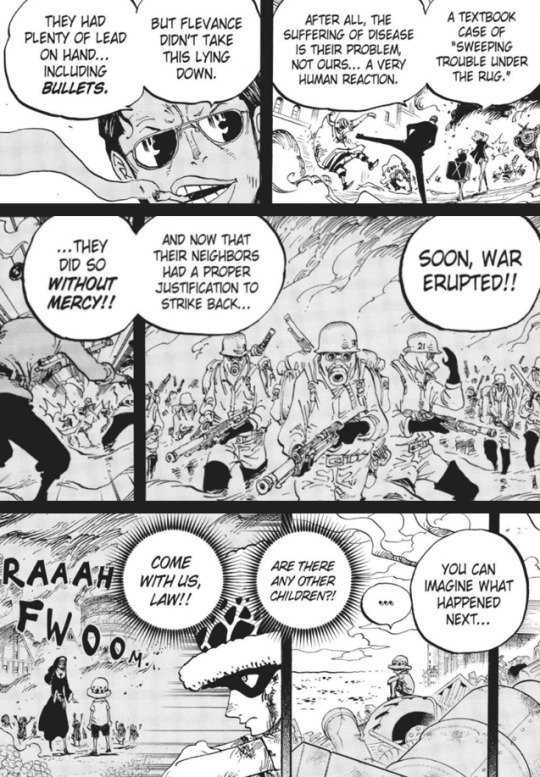
In the bible (especially in the old testament), God often inflicted these insanely disastrous events upon humanity, usually as some kind of punishment for their wrongdoings or as a test of their faith. Some events of which include (but are not limited to): famine, outbreaks of disease and natural disasters (e.g. hail, wildfire, earthquakes, floods). Historically, these stories played a key role in how humanity interpreted meaning from horrible disasters (e.g. assuming bubonic plague was sent as a punishment by god). Fire imagery is very common among these disasters as a representation for hell, which is clearly reflected in the destruction of Flevance.


Sometimes these disasters had sole survivors act as messengers for God. With that context, let’s put ourselves back in the shoes of a ten-year old Law. Raised religious, freshly traumatised from losing his home, his devout family, all the comforts of his life, and having the outside world completely abandon him, this kind of event is likely going to be processed as some form of divine punishment. Law stumbles through hell, finds all his dead classmates, and the last words of sister nun echo through to him here. Merciful and salvation are huge catholic buzzwords – promises of holy compassion, deliverance and hope – and all of it fire and smoke and riddled with bullet holes before him. A genocide funded, perpetuated and covered up by the same body Law was promised was there to save them. And the only reason Law hadn’t died with them was because he wanted to stay with his little sister Lami, who was on her deathbed, and his parents, who were themselves trying to help the afflicted citizens, Law’s own father (before he was shot and killed alongside his mother) begging for more doctors, fresh blood, anything the world can offer, and asking “Why doesn’t the government announce to everyone that white lead is not infectious?”
Oftentimes (and in the case of Law), when there’s a promise of heavenly intervention or some miracle that doesn’t follow through, it results in an ultimate feeling of betrayal and anger. Unfortunately a lot of Catholic teachings also use a lot of guilt, essentially teaching people that the bad things that happen to you are your fault and there needs to be some sort of penance (queue Law’s survivor’s guilt that carries on down the road). But also, if this was supposed to be some divine punishment, for what exactly? For the town being blinded by the incredible wealth they were sitting on? Being lied to? Continuing to extract their livelihood, ignorant of its dangers? Punishment for who? His parents? His innocent little sister? For ten year-old Law? These people who believed in God, who were good people? That’s fucking stupid. None of these people suffered and died for any reason at all — certainly not for a sacred one. God hadn’t saved a single one of them. Law had to crawl out of hell himself by sneaking over the border under a mound of corpses.
Given everything that happened here, Law has every reason to fall into nihilism, and you can see how his upbringing would’ve bred a lot of the feelings of guilt, anger and resentment that you still see in Law (which would suggest that though this is where he likely cuts ties with the religious/Catholic component of his faith, growing up with these teachings in his formative years would definitely influence underlying beliefs about how the world works, and how Law behaves and subconsciously processes information), but at the same time, there’s usually some form of redemption and changes to how these patterns of behaviour can be approached later down the line.
2. Corasan
Fresh off witnessing his whole world burning down around him, Law meets Corazon at the very bottom of this pit of self-destructive rage and unprocessed grief. Rosinante himself mentions to Sengoku that the hatred in Law at this time reminded him of his brother, but beyond the anger, harsh pessimism, vengefulness, I think you have to reach to find similarities between them. You can see some fragments of Doffy in Law down the line at times, with Law seeming to enjoy violence (especially against the navy, but given what they did to Flevance, it’s some well-deserved retribution for Law imo), but I’m not so sure it’s the cruelty so much as it is the high he gets off his own flavour of justice. Doctor’s Hippocratic oath maybe, but never once does Law like seeing others die (even at this point, he’s in tears next to a dead body, even though he’s the one holding the knife), and later on in Wano he makes it explicitly clear to Zoro that he’d rather see the mission fail than have any of them end up dead.
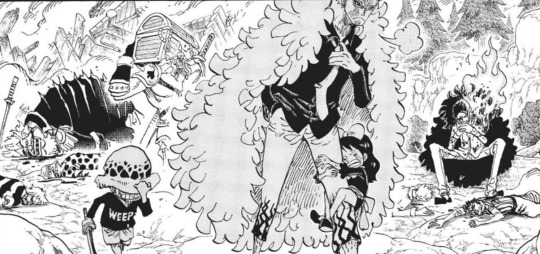
Little Law wanted to destroy the world and everything in it, but thinking rationally, what other choice did this kid have? He had no remaining family, was doomed to die before he hit puberty due to a terminal illness, was perceived as an infectious subhuman that most doctors would’ve sooner tried to exterminate than help. To Law, the world had turned its back on him – considering him a monster for simply surviving. He has all this hatred and pain boiling away with him with no tangible target to direct it towards. And this is the first clear cut rejection of faith that we see in Law. Any concept of a merciful God had just died. What God would allow this? Why is Law alive (a question that he repeats to himself throughout his life), why are these scumbags alive, why is the world going on spinning as if nothing has happened when his whole world had gone up in flames, why does anyone at all get to be here when everything I loved is gone? And it’s far easier to fall into a despondent nihilistic stupor than it is to work through any of that, and what’s the point in trying to process and move on from it, when there’s no hope for a future for Law anyway? When the only thing waiting ahead is more pain? What was this, if not a punishment? He’s supposed to be some messenger for God? How about fuck God, or whatever entity that exists that made him suffer this. Law’s not going to be a messenger for shit, thanks, he’d rather be their monster, he’d rather watch the world burn.
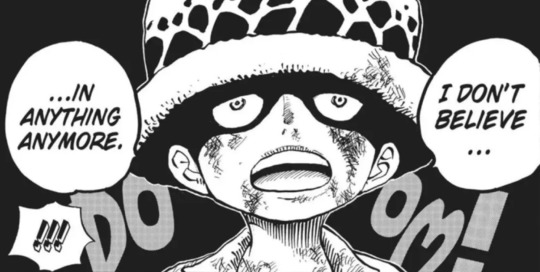
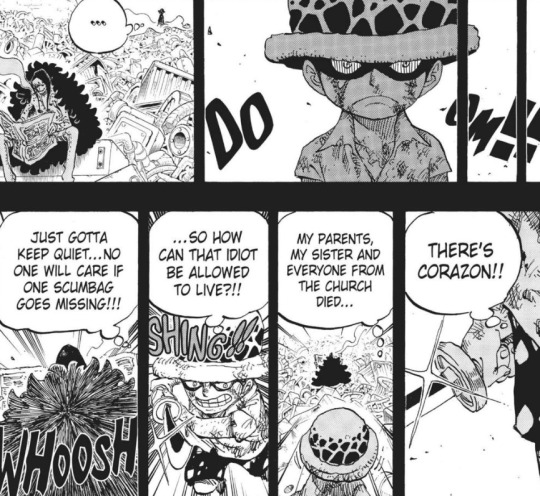
Corazon survives Law’s stabbing and doesn’t rat the little shit out (to Law’s confusion). It’s business as usual for another two years, then, one day Rosinante overhears his true name - Trafalgar “D” Water Law, and everything changes. On the back of his own beliefs, Rosinante dedicates himself to making sure Law a) lives and b) doesn’t become his brother. Law’s relatively short six month stint with Corasan forms the basis of Law’s new creed going forward, and all it took was a bit of kindness, love and humanity when the rest of the world had abandoned him. In the end Rosinante doesn’t save Law for the will of D. and the storm he’s predicted to bring in the future (as Law suspects), but he certainly believes in it, and the strength of Corasan’s conviction transfers right over to Law when he forces the ope ope fruit down the kid’s throat to heal him, tells Law he loves him, then sacrifices himself to set Law free.



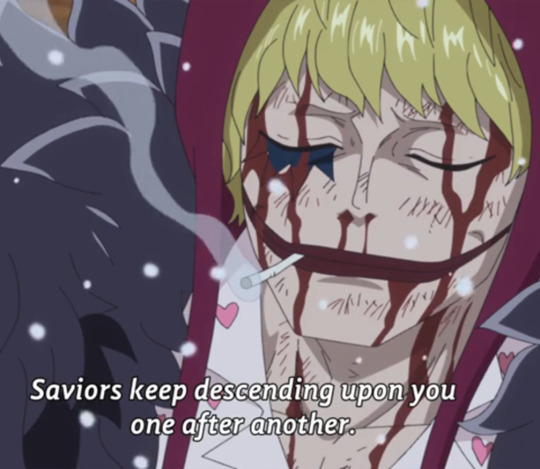
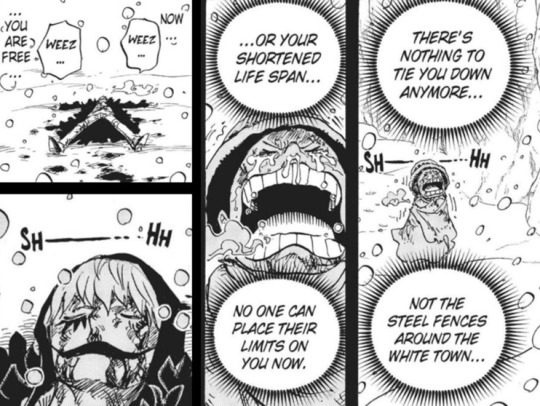
Law clings to that love he was given, he takes all these fundamental teachings and ways of thinking in regards to faith that were drilled into him during his youth, rejects the religion element and applies just about everything else to Corasan. He holds onto the last shreds of what Corasan leaves him with. Corasan becomes his “benefactor” (he gave my my heart), his saviour, his martyr.
And the crazy thing is, Rosinante was never really this saint Law makes him out to be. Law hated the clutz when they first met (mostly on account of Corazon throwing him through a glass window down at least two stories and into a pile of scrap). Corazon initially showed nothing but contempt for his presence (to ward him and the other children away from the Donquixote family, but these are still extreme measures). And it wasn’t until after learning Law’s name that Rosinante dragged him kicking, crying and screaming from hospital to burning hospital (not very saintlike in of itself), even after Law begged him to stop. Rosinante became Law’s saviour partly because of his belief in the will of D., and probably due to some guilt being a Donquixote, but mostly because he has always had a bleeding heart and he pitied (and had very quickly come to love) this angry, sick, deeply lost little kid. All this to say that Law’s faith in Corasan – this saintlike figure Law upholds him as in the future and the lengths he’s willing to go to avenge him/fulfil Rosinante’s purpose reflects the strength of the absolute beliefs Law would’ve been raised with in regards to God.
Whether it be out of survivor’s guilt (just one more body to heap on top of the Flevance pile), his love for Corasan, or for the sake of taking vengeance on the man that took away the one good thing he’d been able to regain in his miserable life, Law adopts Corasan’s will, the will of D. (which in of itself seems divine in nature), incorporates it into his new belief system, actively takes on the role of the divine punisher/justiciar and dedicates his life to bringing down Doflamingo.
3. Luffy
Catholicism dictates that the entirety of someone’s beliefs should be dedicated to one true cause (that cause being God) and expects people to ride on that, letting it carry them through life, give them hope, purpose, etc. But a lot of former Catholics choose instead to find that through something else. Corasan ignited the spark in Law’s faith around the will of D., but it’s not until he meets Luffy that this really becomes something that feels tangible and real for Law.
When Law saved Luffy in Marineford (putting the heart crew in danger for a stranger he met once), he said he did so “on a whim”, but that seems incredibly ooc for Law — this man that pretty much planned out how the rest of his life would go after the dust of Corasan’s death settled and he came to terms with the fact he wasn’t going to die at age thirteen like he’d originally thought. Circling back to the concept of Law being a sole survivor/messenger for God, it is interesting that Law is the one to seek out Luffy (given that Luffy is usually always the one either being abandoned by people or recruiting his crewmates), and Law is ultimately the catalyst for pulling him towards Dressrosa and Wano. There must be a REASON that led to Law deciding Luffy to be the most viable option out of the Worst Generation for an alliance (beyond blind trust in an unhinged captain that just so happens to also bear the initial D, and Luffy being one of the few captains crazy enough to go along with what Law was cooking up).
Law undoubtedly would’ve kept a peripheral eye on Luffy for some time before officially meeting him due to him being a rising competitor pirate and another “D” (I imagine the news of his utterly insane exploits would’ve made good reading material, too). The first time Law lays eyes on Luffy in Sabaody though, he still blows all expectations out of the water — crashing headfirst into the crowd of a slave auction and immediately committing a felony against a member of the most powerful upper one percent.
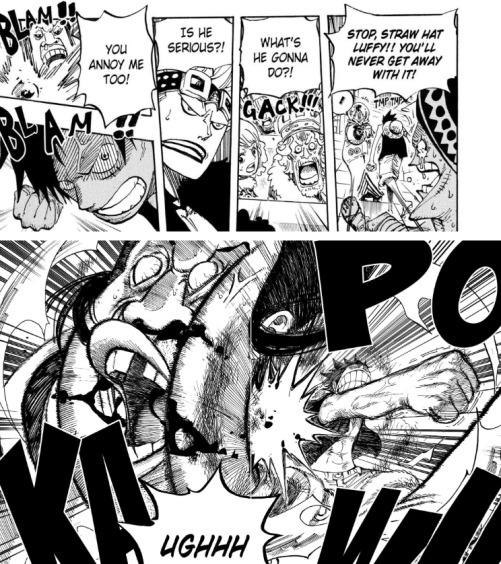

The world nobles are at an “untouchable God” tier in terms of class standing and believe it’s only natural for them to be entitled to whatever and whoever they want in this world that’s beneath them – the same kind of self-aggrandizing false divinity that Law has a a lot of repressed rage towards and that the will of D. is fated to oppose, so this, understandably, is a highly compelling first encounter, but it’s really only an initiating factor for what ultimately draws Law to Luffy. From their very first meeting (and probably before then, in the news stories and rumours Law likely picked up on), it’s made abundantly clear that Luffy does what he wants without a second’s hesitation, no matter the consequences, simply because he feels it is the right thing to do. Some call this an iron will, Law would be more inclined to call it willful stupidity and trouble, but time after time Luffy somehow manages to pull off what Law would best describe as “miracles”. And Law believes the straw hats just might be the ones to drum up another one for him.
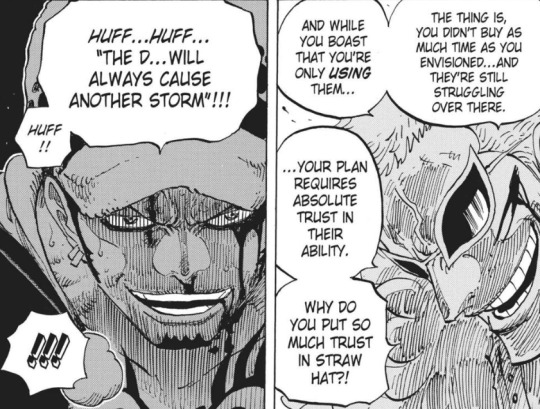
Luffy’s also got a lot of passing resemblances to Corasan going for him, e.g. inherently kind, compassionate liberators with big dumb hearts and wide goofy smiles in spite of everything they’ve been through, treating Law as nakama and saving his life despite his protests etc. All of which I’m sure Law hasn’t been completely unaffected by despite the high walls he puts up. And the more Law learned about Luffy the more it probably became clear that he is the antithesis to Doflamingo, i.e. what makes Luffy so goddamn dangerous and terrifying beyond his physical power is his ability to make friends with a simple kind of unconditional love that gets reciprocated enough so that these friends are willing to die for him.
Luffy agrees to the alliance, they successfully blow up Caesar’s base, and head off to Dressrosa. Now’s the time I should bring up that it’s taught in Catholicism that self sacrifice is the ultimate heavenly deed, and here Law is undoubtedly prepared to be a martyr for his cause. Law sends away his crew to Zou before Punk Hazard with the expectations that he’d never see them. He cultivates a fierce emotional detachment against Luffy’s willingness to bring him into the fold of the straw hats, and is resolute in that when the time comes, he will handle this himself, he will carry out Corasan’s will, and if he has to die for it, he will die with Corazon’s name plastered on his back. (Note here that Christianity is contradictory in that Law being this ready to die here is a sin, because revenge and suicide are highly discouraged, so you could say that by avenging and dying for his saviour, Law would be committing both the ultimate sacrifice and the ultimate sin).
Things get very dicey for Law in Dressrosa, to put it lightly. Doflamingo reveals that he was a celestial dragon (linking back into the will of D. “enemy of the Gods” notion), puts Law on the backfoot and gives him a thorough beating before shooting Law with a couple dozen white lead bullets in front of Luffy (because even when he’s winning Doffy loves to be a cunt about it). By the time Doflamingo is cuffing Law to the heart seat, it’s all looking pretty grim, and it’s very apparent when Luffy shows up to save him, that he is ready to die.

Law here has given up. He spent years planning his revenge for Corasan, but he lost, and he has very little left in the tank (physically, emotionally, spiritually). But Luffy doesn’t listen. Luffy who doesn’t think, doesn’t care, who trampled all over Law’s carefully laid out plan from the get-go and who is willing to take on Doflamingo single handedly for the simple slight that he dared to harm Luffy’s friend Law. Law will never find peace in his own demise because Luffy doesn’t do peaceful. He does loud and unashamed and open with no rhyme or reason other than the excruciatingly simply fact that he loves people and he thinks the people he loves deserve to have good lives. Luffy chucks Law over his shoulder and drags an injured Law across the city despite his protests (sound familiar?) and in the process inspires the fighting spirit in Law again.

When Law confronts Doflamingo again with Luffy in tow, Law’s faith in Luffy confounds him. The last Doflamingo remembers of Law is this beautifully moldable dark pit of grief and rage who’d given up on believing, period – who wanted the world destroyed. Not so long ago, Law had been a candidate for Doflamingo’s next protégé. Now?
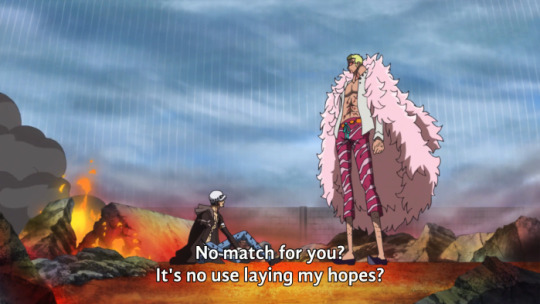


THIS is the action (grinning, staring down the barrel of a gun, flipping Doffy off as he tells him in not so many words that he may kill Law but he will never beat Luffy), Law’s unshakeable faith in the face of his own death is what has Doflamingo realising he will never regain control of Law again – is what incites Doflamingo to go from breaking Law down so he can build him back up again, to conceding defeat and outright killing him.
The trust that Luffy inspires in Law and the way he talks about Luffy (Luffy being this powerful, miracle-inducing liberator that Law can’t comprehend but follows anyway, Law laying down his hopes on him, weaponizing the will of D. to try and provoke fear from Doffy), is very reminiscent of the awe and faith talked about in scripture. Law discovers the feelings of comfort and hope that Catholicism was supposed to give him in Luffy, but Law’s belief in Luffy is a direct rejection of those teachings. Rejection by believing in a real life person as opposed to the divinity he was taught about. He’s also cementing his belief in the will of D., thus rejecting Doflamingo and all the people that embody the sort of “all powerful” divinity that he abhors (i.e. celestial dragons, Kaido, the Gorōsei/five elders) for the embodiment of hope and humanity.

When Law survives (again), he expresses he’d rather see Luffy beat Doflamingo with his own eyes or die with Luffy if he loses than leave. Then he watches, after all this talk of miracles, looking up in reverence as Luffy delivers, bright as the sun, haloed by the bars of a cage that’s haunted him for over a decade, Corasan’s words echoing at the back of his mind. God had never saved or freed Law, but Corasan was there for him, the heart crew was there, Luffy was there. And this is Law’s biggest, clearest rejection of religion – this newfound faith in humanity.
This faith in Luffy is put to the test again in Wano when Luffy is struck down by Kaido, but Law never truly stops believing that he’ll make a comeback. Even when the straw hats doubt whether he’s alive or not, something tells him Luffy’s not dead, and he holds onto that hope.
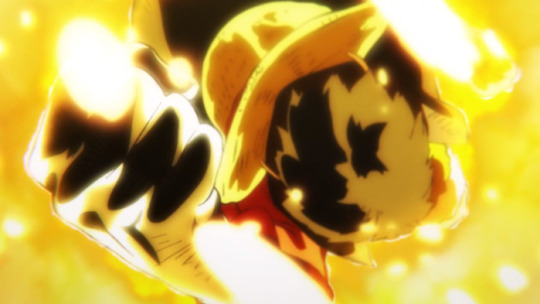







We also have the whole nika/joyboy backstory which really only reinforces all of this imagery/god-fearing looks of awe from Law and this idea of Luffy who is this perfect juxtaposition of empathetic and kind to incredibly fearsome fire and brimstone fighter. And regardless of whether you’re into the ship or not this is the impetus of Law’s relationship with Luffy for me, because here’s Luffy who has every right to have a chip on his shoulder and be downtrodden about all the injustices against him, here’s this little guy who against all odds, in the darkest of places, embodies light and hope and kindness and proves to Law that there will be hard times but there IS a happy ending at the end of the tunnel, despite it all. And everytime Luffy rises to the insurmountable challenge and wins, it just further cements that the will of D. is alive, that Corasan was right, that there's something redeemable in Law, a reason why he was worth saving, even if Law doesn’t understand it quite yet.
#merry christmas law religious trauma be upon ye#what’s an endearing idiot to a non-believer#long post#favourite character thesis statement. or something#ive been wanting to talk about this for a while but just been gathering my thoughts#will preface all this by saying I was not born or raised religious but the concept’s all very compelling from an outsider’s perspective#but I have had conversations about this to people like lesbianluffy who *were* raised catholic and relate to this experience#who I have to thank a lot for helping me wrap my head around this#this is a compilation of thoughts and conversations over the last two or so months#one piece#op#CJ's op watch-through#trafalgar law#monkey d. luffy#donquixote rosinante#donquixote corazon#monkey d luffy#lawlu#trafalgar d water law#gear 5 luffy#sun god nika#wano spoilers#lulaw#op meta#op analysis#one piece analysis
391 notes
·
View notes
Text
I don't really see people talking about how cultural Christianity is applied to Jews.
In Christianity, Jews are the people who rejected and betrayed Jesus and are punished with statelessness and destitution, whose only redemption is accepting the Messiah and the Son of God. This is the basis of several antisemitic tropes, most prominently deception, religious supercessionism and the Wandering Jew.
In cultural Christianity, these tropes are considered tenants of Judaism rather than Christianity, as Judaism is considered Christianity without Jesus.
Christians see themselves as tortured saints, persecuted for spreading the truth of Jesus and God across the globe. Missionaries who go to non-Christian lands to try and get the people to convert by fearmongering with damnation to Hell see themselves as victims when they're rebuffed and asked to stop.
Cultural Christian non-Christians are usually atheists and adherents of folk religion revivalist movements who have suffered religious abuse, as many sects of Christianity normalize emotional abuse by instilling inherent guilt in the Original Sin and even physical abuse in "Spare the rod; spoil the child". These cultural Christians see the millennia of antisemitism and roll their eyes, to them we're just another sect of delusional religious people with a persecution complex.
To become a Christian all you need to do is accept the Father Son and Holy Spirit, to affirm your beliefs and confess your sins. To become a Jew you are either born a Jew, or you learn the Jewish culture and religion for months on end and must live half a year under the strictest restrictions of the Jewish lifestyle to show commitment. That is the difference between a universal religion and an ethnoreligion.
In a Culturally Christian world there is no room for ethnoreligions, and they do not exist. All religions are about your faith and which God(s) you believe in. So in a Cultural Christian's eyes, a country of Jews is a country that holds one faith supreme above all others and conditions rights with conversion, as that's how Christian countries have historically been.
Christianity's common ground with Jews comes from the Roman Empire appropriating the religion from the Cult of Jesus, and making it more appealing to the masses by introducing Greco-Roman and Germanic folk religion aspects into it. Xmas is Yule but with Jesus, Easter is a fertility holiday but with Jesus and so on. In the eyes of the Cultural Christian, Christianity and Judaism are two once-antagonistic sects of the same religion, no different than Catholics and Protestants.
Cultural Christianity erases and appropriates Judaism and is as inherently hateful of Jews as religious Christianity.
Now, when it comes to the elephant in the room: Islam.
Islam, like Christianity, is a universal religion. You must believe in Allah and accept the prophets, which include both Jesus and Muhammad. It is no more inherently violent than Christianity, though it's no less. In the Christian's eyes, Islam is the competitor, the enemy. The Muslims conquered Christian lands and converted them, and they've fought holy wars against one another throughout the Middle Ages.
To become a Muslim the Cultural Christian doesn't need to unlearn any of the core tenets of their culture. They can simply apply it to Islam.
Which is why many Cultural Christians, damaged by Christianity, are sympathetic to Islam. And since Muslims and Jews are no longer on good terms, they use this sympathy to give themselves a free pass to be antisemitic. Whether Muslims check their converts for bigotry, allow it or are powerless to stop them, that's another issue.
Jews are not diet Christians. We have less in common with you than you have with Muslims. Unlearn Christian cultural appropriation.
And no, I don't care that it's "offensive" to associate you with Christianity due to the religious abuse you endured. You still see the world through a Christian lens.
#cultural christianity#christian supremacy#Christian imperialism#religious supercessionism#wandering jew#wandering Jew trope#christian antisemitism#antisemitism#leftist antisemitism
227 notes
·
View notes
Note
Why do you say Palestinians are from there (Israel/Judea/Samaria) when their names literally say where they are from (Egypt, Syria, Lebanon etc.)
I agree that they are living there now and because of that I 100% believe they need to have the right to share their homeland with the Jewish people but it's a weird historical revisionism that continues going on and when people fail to acknowledge that the very name Palestine is from colonialism in the land it's whack as hell
I wanted to take time to think about how I respond to this ask, because there are legitimate points being made about how Arab colonialism and imperialism has impacted the region, and how the Roman choice of the name Palestine was made to alienate Jews.
One really important thing to keep in mind here is that Palestinians are not a homogenous group - some lean very heavily into Arab heritage, some lean into Syrian heritage more broadly, some want to help fortify a Palestinian identity, some identify very heavily with Islam, some identify very heavily with Christianity (though we don't hear from them very often). There are people who could be accurately called Palestinians who were also Jewish, or people who have ancestry from a mixture of different backgrounds. Palestinian is not a homogenized identity, and they are not all Arab, but many are Arabized.
There were people coming from every direction in that region. A ton from the Middle East - specifically the Arab world, but also some from Europe and Anatolia, etc. When these groups intermarry over time, I think it would be fair to say that, due to Islamic marriage conventions, where Muslim men can marry non-Muslim women, but not vice versa, there was a bias towards Arab naming convention. Nevertheless, many of these people likely descend from Jews, Christians, Muslims, Europeans, Arabs, Syrians, and more.
There are a few problems with some conceptions of indigeneity, especially when we root the concept in somebody's literal genetic ancestry as opposed to say... cultural background, community participation, spiritual background, etc. It is easier to use these concepts to talk about places like North and South America and Australia, where there are *pretty clear lines* between indigenous and nonindigenous people (though not always, consider the example of a man who marries an indigenous woman and then begins to fully and authentically participate in her family and community, such a person might be said to have an authentic connection to indigenous identity, even if he was not raised indigenous himself).
Outside of cross-continental kinds of situations, it becomes difficult to evaluate these things using the concept of indigeneity, especially in the Middle East. But with my understanding of the history of the area, I am pretty confident asserting that Jews and Palestinians (and there is crossover between these groups) both are indigenous to the Levant, and both deserve to have a future there, safe from violence, hunger, terrorism, and war.
81 notes
·
View notes
Note
Inspired by your last ask! What are the best French books you’ve read that have no English translation yet? I read Play Boy and Qui a tué mon père (really loved the latter) last year and it feels so fun to read something that other Americans can’t access yet
I'm too nervous to make any list of the Best XYZ Books because I don't want to raise your expectations too high! But okay, here's my No English Translation-themed list of books I've enjoyed in recent years. I tried to make it eclectic in terms of genre as I don't know what you prefer :)
Biographies
• Le dernier inventeur, Héloïse Guay de Bellissen: I just love prehistory and unusual narrators so I enjoyed this one; it's about the kids who discovered the cave of Lascaux, and some of the narration is written from the perspective of the cave <3 I posted a little excerpt here (in English).
• Ces femmes du Grand Siècle, Juliette Benzoni: Just a fun collection of portraits of notable noblewomen during the reign of Louis XIV, I really liked it. For people who like the 17th century. I think it was Emil Cioran who said his favourite historical periods were the Stone Age and the 17th century but tragically the age of salons led to the Reign of Terror and Prehistory led to History.
• La Comtesse Greffulhe, Laure Hillerin: I've mentioned this one before, it's about the fascinating Belle Époque French socialite who was (among other things) the inspiration for Proust's Duchess of Guermantes. I initially picked it up because I will read anything that's even vaguely about Proust but it was also a nice aperçu of the Belle Époque which I didn't know much about.
• Nous les filles, Marie Rouanet: I've also recommended this one before but it's such a sweet little viennoiserie of a book. The author talks about her 1950s childhood in a town in the South of France in the most detailed, colourful, earnest way—she mentions everything, describes all the daft little games children invent like she wants ageless aliens to grasp the concept of human childhood, it's great.
I'll add Trésors d'enfance by Christian SIgnol and La Maison by Madeleine Chapsal which are slightly less great but also sweet short nostalgic books about childhood that I enjoyed.
Fantasy
• Mers mortes, Aurélie Wellenstein: I read this one last year and I found the characters a bit underwhelming / underexplored but I always enjoy SFF books that do interesting things with oceans (like Solaris with its sentient ocean-planet), so I liked the atmosphere here, with the characters trying to navigate a ghost ship in ghost seas...
• Janua Vera, Jean-Philippe Jaworski: Not much to say about it other than they're short stories set in a mediaeval fantasy world and no part of this description is usually my cup of tea, but I really enjoyed this read!
Essays / literary criticism / philosophy
• Eloge du temps perdu, Frank Lanot: I thought this was going to be about idleness, as the title suggests, and I love books about idleness. But it's actually a collection of short essays about (French) literature and some of them made me appreciate new things about authors and books I thought I knew by heart, so I enjoyed it
• Le Pont flottant des rêves, Corinne Atlan: Poetic musings about translation <3 that's all
• Sisyphe est une femme, Geneviève Brisac: Reflections about the works of female writers (Natalia Ginzburg, Virginia Woolf, Sylvia Townsend Warner, etc) that systematically made me want to go read the author in question, even when I'd already read & disliked said author. That's how you know it's good literary criticism
Let's add L'Esprit de solitude by Jacqueline Kelen which as the title suggests, ponders the notion of solitude, and Le Roman du monde by Henri Peña-Ruiz which was so lovely to read in terms of literary style I don't even care what it was about (it's philosophy of foundational myths & stories) (probably difficult to read if you're not fully fluent in French though)
Did not fit in the above categories:
• Entre deux mondes by Olivier Norek—it's been translated in half a dozen languages, I was surprised to find no English translation! It's a crime novel and a pretty bleak read on account of the setting (the Calais migrant camp) but I'd recommend it
• Saga, Tonino Benacquista: Also seems to have been translated in a whole bunch of languages but not English? :( I read it ages ago but I remember it as a really fun read. It's a group of loser screenwriters who get hired to write a TV series, their budget is 15 francs and a stale croissant and it's going to air at 4am so they can do whatever they want seeing as no one will watch it. So they start writing this intentionally ridiculous unhinged show, and of course it acquires Devoted Fans
Books that I didn't think existed in English translation but they do! but you can still read them in French if you want
• Scrabble: A Chadian Childhood, Michaël Ferrier: What it says on the tin! It's a short and well-written account of the author's childhood in Chad just before the civil war. I read it a few days ago and it was a good read, but then again I just love bittersweet stories of childhood
• On the Line, Joseph Ponthus: A short diary-like account of the author's assembly line work in a fish factory. I liked the contrast between the robotic aspect of the job and the poetic nature of the text; how the author used free verse / repetition / scansion to give a very immediate sense of the monotony and rhythm of his work (I don't know if it's good in English)
• The End of Eddy, Edouard Louis: The memoir of a gay man growing up in a poor industrial town in Northern France—pretty brutal but really good
• And There Was Light, Jacques Lusseyran: Yet another memoir sorry, I love people's lives! Jacques Lusseyran lost his sight as a child, and was in the Resistance during WWII despite being blind. It's a great story, both for the historical aspects and for the descriptions of how the author experiences his blindness
• The Adversary: A True Story of Monstrous Deception, Emmanuel Carrère: an account of the Jean-Claude Romand case—a French man who murdered his whole family to avoid being discovered as a fraud, after spending his entire adult life pretending to be a doctor working at the WHO and fooling everyone he knew. Just morbidly fascinating, if you like true crime stuff
#ask#book recs#the book i started reading last night is The Naked Neanderthal by Ludovic Slimak and i also didn't#expect it to have an english translation but it does#i'm only at the beginning and so far it's philosophical ponderings about what kind of creature the neanderthals were#if they were humans in a different way than us. with a different kind of intelligence#and how to understand it without projecting our own way of being in the world onto this other humanity#sorry to quote cioran again but it reminds me of when he said every generation misses the good old days and#if we retrace our steps from regret to regret we'll find the original regret#our nostalgia for a time when humans weren't yet human
215 notes
·
View notes
Note
i just want to say how i respect how you defend your religion with facts and sources even though im not muslim reading what you write has made me realize my religion villianizes you unfairly and im sorry for all the ignorance you have faced your page has opened my eyes on different perspectives so thank you for that i hope you have a blessed day
im glad im able to make everyone see islam in a different light than what yall have been shown. a few people have said that they dont enjoy reader being a muslim in this au because it just doesnt feel like reader insert anymore, and look- im not forcing u to read it, but is it really that hard for yall to use ur own imagination to alter reader's traits to ur liking? and of all the fics, this is my first au where i made reader specifically muslim because... idk- i wanted to. if im talking about the oldest, largest religions- christianity and islam, and they've always been butting heads, so wouldnt it make sense for reader to be on one side or the other? "but SNOW- why not make reader christian??? is it because u hate christianuty??!" no girl, i just know more about islam because im muslim and i think muslim readers are not that much written about and if i can read fics where reader aka me, had to marry the mmc in a church, then yall can bear with it too.
honestly, its only a big deal if u make one out of it. its just ... religion ok? u dont have to accept the belief, just respect it enough that you can learn a few things? i mean thats what i do when im researching about different religions and historical figures- just learn stuff.
religion has never villainised me, its just cultural and preconcieved notitions by people that villainise islam.
one day, when im able to learn arabic PROPERLY, ohhhh i will show u what a fun language it is- one word can have SO MANY MEANINGS OMG and like its like a language with riddles, so interesting and it gives a completely new perspective to Quranic verses then. (arabic readers, please tell me im not wrong)
72 notes
·
View notes
Note
Why is the fact that Jesus and Jews were from Israel considered controversial? It’s what we’re taught at school (and for Christians - church) in the US.
I’m genuinely asking, this isn’t sarcastic. No one I know has ever disputed that fact before.
Hello!
You're referring to this post.
It's controversial because denying the connection of Jewish people (especially Ashkenazim but not only) to the land of Israel is a fundamental aspect of post-modern antisemitism.
Classical and modern antisemitism, particularly in Europe, relied on the Jewish people's foreignness to dehumanize them. It was obvious they were Not From Here, despite living there for centuries and longer, and many demanded that they Go Back To Where They Came From. And then they did.
But antisemitism didn't go away just because Israel was founded, it simply morphed, just like it had between its classical phase (centered on religious otherness, religious "crimes" and blood libels) and its modern phase (centered on race theory and economics).
Of course, right-wingers are still classically and modernly antisemitic. They usually don't bother to hide their hatred, it's pretty fundamental to their ideology and identity (though there are aspects of hiding, especially with holocaust denial). But the left has always been just as antisemitic as the right. But it has also grown in the post-modern age, after world war 2, with specific ideologies, centered around notions of humanism and the importance of human and minority rights. And antisemitism doesn't sit well with these notions, especially not after the holocaust... So something had to change. Unfortunately, it wasn't the antisemitism.
This is a classic cognitive dissonance; I feel something (hatred for Jews) that is inconsistent with my ideology (hating people based on their ethnicity is bad). In such instances you can either 1) work to change your actions (it doesn't matter what I feel, as long as I don't harm Jews, and eventually I might change my feelings for them); or 2) change your believes (Jews aren't a category worth protecting).
Now, "hating Jews" is still a big no-no in western left circles. Even now you can't actually directly say it (obviously this was true before October 7th. It seems like even these rules are changing as we speak). So westerners needed to do two things: 1) white-ify the Jewish people (especially the Ashkenazim) and 2) shift the focus on Israel.
The white-ification of the Jewish people is a major theme is western leftist circles in the past 70 years, especially in the US because of its complicated history with race and ethnicity, but it's prevalent in many other countries as well (it should be noted that Jewish people themselves have contributes to this phenomena for many reasons, but this is not the place for this discussion).
In the post-modern age, "whiteness" means "evil" and it is connected to European and western imperialism and colonization. So, essentially, they change what being a Jew is - a white person, as opposed to a Levantine person. This is where some of these people will do mental gymnastics to deny where Jews are originally from, whether denying modern Jews have anything to do with the historical ones (and many choose this route) or somehow both admitting they are from Israel but saying it doesn't matter because it happened a long time ago and then with the same breath talk about how Palestinians are the indigenous ancient people of the land (they are both indigenous, the world is just that stupid). Now, since white people are evil, they are open for criticism, especially if they are colonizers. And since Jews are white now, it makes no sense for them to live in the Middle East.
Which brings us to refocusing their criticism on Israel. Here, people have to walk a fine line between a legitimize political criticism of the Israeli government and the society itself throughout the years (and there are MANY justified criticisms...) and just being antisemitic. Unfortunately, western leftist circles tend to lean more heavily into the latter. And, again, as has been particularly evident for the last three weeks, their focus is on identifying Israel as colonizing enterprise, not just beyond the 67' Green Line, but by it's very nature of existence, since Jews are white now and don't belong there.
And now, once again, they call us to Go Back To Where We Came From (just to be very clear - Palestinians and the rest of the world are doing it as well), despite that part of the world literally saying "don't bring them here, they are not from here", like they always did, just like the post OP was sharing. Only those Europeans aren't saying "Jews are from the Land of Israel and they deserve to live there", they are just saying what the entire world has been saying for the past two thousand years - we don't want Jews anywhere, period.
They don't give a shit about where Jews are from. Some of them say we're from Europe for the sole purpose of destroying Israel. And they would gladly displace millions of Jews and send them to live again with the people who tried and nearly succeeded to annihilate us. Everyone else just don't care, as long as they can hurt us, but also refuse to accept us as their own. And trust me - if and god forbid when millions of Jews will once again become refugees, not a single nation around the world from which We Came From would take us in. Not one.
I know that people know where Jews are from, but the fact remains that huge sections of the world right now, especially on the left side of the political map, will actively deny it.
Because the truth is - the world doesn't give a shit what Jews are or are not. The world doesn't give a shit where Jews are from or aren't from. The world doesn't want Jews in Israel, and it doesn't want Jews anywhere else.
The only place the world deems the Jews to belong to is their graves.
352 notes
·
View notes
Note
Hi Hilary! I could use some help with something. Do you know some topics for historical tangents a history professor (Hob) could go on while talking to some students? Like some interesting discussion ideas? I was not a history major and I’m now drawing a blank 😅 I’d appreciate it greatly!
"Right, morning everyone... MORNING... yes, we all do know it is morning and I would like to remind everyone that it's not my fault we were scheduled at eight bloody AM. Consider it building character. Great. Let's get started. Can we put the phones down, please. In my day we didn't even have phones. No really. We didn't. Really didn't.
Anyway, so where were we? Ah, yes. End of the Western Roman Empire circa 476 CE, which stands for the secular Common Era, which historians now generally use instead of the Christian A.D. Anno Domini, which trust me, they used when I was born, because I am very old. Ah, you're laughing again, because you think I'm joking. Which, er, I definitely am. Anyway, the so-called collapse of the Roman Empire is one of the most mythologized events in the Western historical canon, and there are accordingly a lot of misperceptions about what happened and how. As we covered in the last class -- well, can anyone tell me what we covered last class?
Anyone?
Anyone?
Come on, one of you, just raise your hands. I don't bite.
Fine, all right, I'll do it myself. Again. Last class, we covered the eventful fourth century in Roman history, where the empire split into western and eastern halves, eastern Emperor Constantine converted to Christianity, and established his capital in Constantinople, which would later get the works from the Turks and become Istanbul. The western capital moved to Ravenna in 402, and it had been in Milan before that, not Rome. No longer the center of power as it had been for many centuries beforehand under both the empire and the republic, Rome was infamously sacked in 410 by the Visigoths under King Alaric I. The Supergoths. The Ubergoths. The Verygoths. The Turbogoths. All right, I'll stop. The Visigoths had formerly been a Roman client kingdom in the south of Gaul, which is the modern country of -- anyone?
Anyone? Anyone? Oh come on.
Yes, thank you Sarah, it was in fact France. See everyone? Not that hard. Now that we're up to speed, right, the so-called End of Rome in 476, when the last Western emperor, Romulus Augustulus, was deposed by Odoacer, general of the Ostrogoths. Not the Visigoths. Definitely different thing here. The Alsogoths. The Othergoths. The Ohgodthosegoths. I'm sorry, I'm sorry. I swear I will actually stop. But the common narrative from then is that Rome just bloody disappeared altogether, the Dark Ages started, it was grim and miserable and murdery all the time, everyone forgot how to do scholarship or art or religion or anything else, and then miraculously a thousand years later, woo, the Renaissance! Everyone sorted their heads from their arses and could do maths again! I'm sorry about saying arses. Please don't report me to HR, they've had enough of me already. Anyway, this argument, despite its long-time supremacy in the Western historiographical canon and Western popular culture, doesn't make sense on any number of levels. And that is because? Can anyone give me just one reason to start with?
Anyone?
Anyone?
Sarah again, yes, thank you. I appreciate you greatly, Sarah. Yes, for one thing, the Eastern Roman Empire still bloody existed! It was literally that meme where we're announcing that Rome is dead, Constantinople wants us to stop telling everyone that they're dead, and we sigh that sometimes we can still hear their voice. Yes, I know what a meme is, don't look so surprised. The city of Constantinople became the center of Roman culture and power, though we call it the Byzantine empire to distinguish it from the pre-476 Roman empire. It used Greek instead of Latin as its primary culture and language, it was Orthodox Christian instead of Catholic Christian, and while it was no longer the multinational power player that its predecessor had been, it still produced some heavy hitters. Such as Emperor Justinian in the sixth century, who actually, albeit briefly, reconquered the territories of former Rome in the west, and was married to the very fascinating Empress Theodora. We'll have to get back to her, but anyway, in the territories of Former Rome, such as modern-day Spain, France, and Germany, there were still client kingdoms who were directly descended from Rome and who premised their new independence on their Roman inheritance. The Visigoths -- yes, them again -- in Spain, the Merovingians and the Franks in France, the Angles, Saxons, and Jutes in Germany, and other. So tell me, can we really say that Rome collapsed, exactly, and/or disappeared, instead of just dissipated and re-formed? We still had Latin as the language of state administration, the Roman Catholic Church as the supreme religious and cultural arbiter, and other major innovations that would last through the Middle Ages. Where does this whole Dark Ages thing come from?
Anyone?
Anyone aside from Sarah?
Oh, God's wounds. All right then. The idea that Rome disappeared overnight and took everything good with it is a projection, a fiction, popularized by proto-Renaissance and Renaissance writers who wanted to legitimize their look back into the past. We're getting ahead of ourselves, but the idea of the Dark Ages as this backward slovenly time of idiocy and misery -- it just gets me very worked up, all right?! Yes, written texts and certain other traditional markers of historic narrative became much scarcer than before, and we don't know as much about it as we do the more meticulously documented societies on either side, but it's only dark because we've decided that Rome, the brutal excessively slave-owning militaristic expansionist violent empire par excellence, was the marker of all culture and the peak of Western civilization for all time and nobody else could ever come close! This is how we get bloody Game of Thrones insisting that the medieval era was always filthy and dark and full of rape and violence and morally awful people -- so tell me, George, which part of your fantasy novel, the dragons or the ice zombies, were we expected to read as actual literal truth? It's just because we want to protect the idea of ourselves as so much better than people in the past, and the past itself as full of terrible violence that is somehow worse and more primitive than our violence, and that surely we could never do that because we're so much better! Which is total bullshit! Bullshit!
...yes. Thank you. Right. I'm fine. I'm absolutely fine, I apologize for that. Just a bit of a trigger for me. We'll get back to the lesson now, yes. I'm warning you, though. If you use Dark Ages uncritically in your essay, I am knocking you down a full grade. No matter what."
#acedragontype#ask#history#hob gadling#you're welcome to use all/parts of that as you wish XD#ahem#or: how the fall of the western roman empire gets Hob to blow a gasket about game of thrones
89 notes
·
View notes
Text
Youtube Essays Shill Post
I'm getting close to 1000 subscribers so I'm gonna make a shill post for my channel. I make videos on independent RPGs (no D&D/Pathfinder etc), highlighting narrative moves, the intersection of mechanics and themes, and analyzing them in parallel with books, movies, and game theory. I've had a really great crop of essays this year, and I bet at least one of them will do it for you:
###
youtube
Spire RPG & Babel: The Monstrosity of Empire, the Necessity of Violence (52 min)
I read Spire: The City Must Fall in parallel with RF Kuang's Babel: An Arcane History, and try to make the connection between Spire's worldbuilding and the British Empire's historical methods of extracting labor and resources from its colonized subjects. I'm especially proud of how I work through the ways in which Spire's Drow are treated as commodities, emulating how Britain's most valuable resource was human beings, and discuss why there's not an alternative available to the Drow except for violent uprising.
youtube
Heart RPG, Annihilation, and Sangfielle: Brainworms all the Way Down (38 min)
I follow the themes of compulsion, infection, and dissemination of a supernatural intelligence that I found both in Heart : The City Beneath and in Jeff Vandermeer's Annihilation. It's kind of gross, but if you like reading about parasites, strange urges, and transformations that destroy the self, you'll probably be into this. I also make a few references to Friends at the Table's Sangfielle season, if you're a FATT fan.
youtube
Apocalypse Keys and Desperation to Belong (15 min)
Apocalypse Keys is a really interesting game, but it's also the most emotional game I read this year? It's all about heartbreak, longing, and trying to hold on to the people you love, even though you know you'll lose them in the end. The essay is also very much tied up in my feelings on diaspora, faith, and what it's like to be excluded, except for the home you make for yourself. It's also like, undeniably queer in a way I think a lot of folks will relate to.
youtube
The Endings of Hellwhalers and the Fewness of the Saved (28 min)
Okay I actually talk about being an ex-Catholic a lot, but this is my most explicitly religiously-inspired essay. I compare the text of Hellwhalers and its interpretations of Christian hell to the actual Catholic doctrines of hell, including the sermon that eventually made me break away from the Church altogether. If you like whales and religious trauma, please check this out.
###
Please consider taking a look at my channel! I hate having to beg for viewers, but there's just no other way to build an audience, and I'm really proud of the work I've done this year!
216 notes
·
View notes
Note
Hey-o! Tis the season for people to talk about how the holidays were "actually pagan" and I'm on the hunt for sources about how that's really not the case, if you have any you'd recommend!
Okay, so the problem is there are so many weird "Christmas is stolen!" bullshit memes going around, it's so hard to just give you a comprehensive list of sources. Christmas celebrations have evolved as the religion has spread, and different things come from different times...
The key here is to go for academic sources. This is a question of history, and a well supported historical research is going to tell you whether they're operating from primary, secondary or tertiary sources.
So while I can't give you a simple list, let me give you a couple of examples off the top of my head and give you tips on how to investigate any the dumb claims that get passed around.
Christmas being in December: So a lot of people go for the "Christmas is in December so it can steal from [INSERT SOLSTICE CELBRATION]" is ahistorical... because we know exactly why Christmas is in December. Because the guys who made the decision argued with each other and left behind written documentation. The two big names you need to look up are Clement of Alexandria (who pitched January 6th) and Hippolytus of Rome (who proposed December 25th). This is around the turn of the third century, and you can find both of their writings. Some folks have questioned the authenticity of some of Hippolytus of Rome's writings, but Clement of Alexandria's seem well supported. These were internal arguments about when the birth of Christ took place within the early church, and when they settled on late December. There are reasons for this, and you can read their arguments (it largely has to do with the importance of when Jesus was conceived -- they wanted that to be an important date and then added nine months to it). Importantly though, because linear time is a thing, this means Christmas was set in December before the Christianization of the Germanic and Norse tribes... so anyone who says Christmas was set to December to correspond with Yule doesn't understand the concept of "coincidences."
The Christmas Tree: The Christmas tree was invented in 16th century Germany. That's... that's just written down all over the place. Now, there are legends about Martin Luther being the first who did it -- but I'm pretty certain that's just an embellishment that got added on. There are preceding traditions where part of an evergreen was brought into the home as a part of solstice traditions (though some will claim the Egyptians did this? Which is wild -- likely misinterpreting their use of palm fronds as the same thing), but the act of taking a whole ass tree, cutting it down, putting it in your house, and decorating it? That's 16th century Germany all the way. You can rabbit hole so many sources on that one, but honestly just pick apart the citations on the Wikipedia page. Putting a branch in your house and dragging a whole tree in are very different acts.
Jesus's story is copied from [INSERT RANDOM GOD]: There are so many of these, and some are just downright disrespectful to major world religions (the Krishna version of the meme especially). The answer is... just see if what the meme is saying about the god is supported by the mythology. Like I've seen ones that says Dionysus was "born of a virgin." If you know anything about the Greek gods, you're probably already laughing on the floor. Horus gets dragged into this too, because Gerald Massey was trying to pull a "White Goddess but with Dudes." But any serious research on Horus will tell you the supposed parallels aren't supported by the mythology.
So sorry, this wasn't so much sources you can use as it is how to look for them to begin with. Because there's just so, so much. This isn't even covering cases of syncretism, where pre-existing cultural traditions got continued post-Christianization. Because it's almost always the case that if a pre-Christian practice endured post Christianization, it's because people decided to keep doing it -- not because the church was trying to "steal" it. The latter means there was some mustache twirling plan behind it, when the former means (usually) the church went "Well, they're paying their tithes and saying it's for Jesus, so who gives a shit?"
I'm just going to finish this off with linking to my podcast episode on this, along with Ocean Keltoi's great Yule video on the topic. Hopefully that helps.
youtube
190 notes
·
View notes
Text
Damn the people in Genshin's official sub have been full-on schisming about Furina these last few days.
It's the most impressive thing to watch btw. I'm basically taking notes to write fantasy setting sects because while researching historical schisms can tell you the bones of how people go from agreement about something to "we're different religions now", seeing how people formulate the argument is something else.
I'm putting some prints after the break because this is heavy spoilers after all.
Here's some of what I collected:
The argument that Every Part of The Whole Contains The Whole Itself (or maybe that personhood isn't defined by a separate embodied presence and experiences but by a Secret Third Thing. I'm not sure.)

2. The argument that Fate/Celestia Is Omniscient Thus Can't Be Fooled, ergo Furina had to be divine (this one bothers the hell out of me because the whole point of the quest was that fate CAN be fooled or at least misdirected as long as you reach the right story beats. And we've known for ages that Celestia isn't watching.)
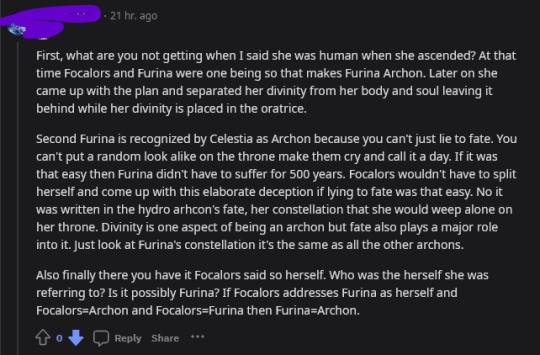
3. The argument that You Can't Tell Which One Is The Copy, and, furthermore, that No One Died Because Focalors As We Met Her Wasn't a Person (this one is kinda extra-esoteric)
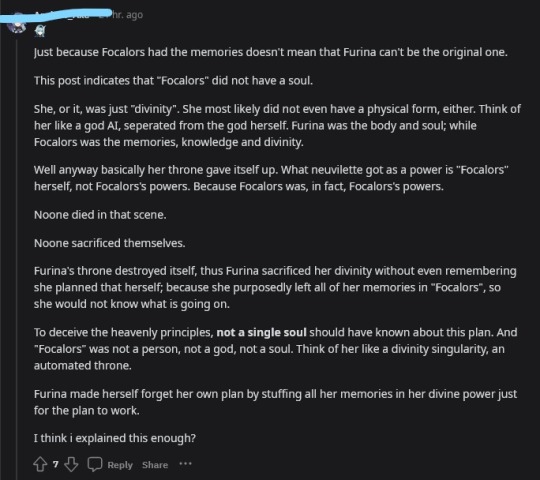
4. The argument that Focalors Was a Persona Inside Furina's Mind All the Time (despite the fact that the story tells us Focalors was the Oratrice):
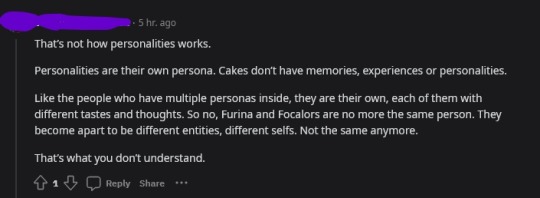
Just FYI the poster is talking about cakes because there was an attempt at an explanation though a cake analogy (I don't think this poster got the rhetoric.)
5. I'm putting the obligatory "ship of Theseus" reference here because this is tumblr and we're simple people here.
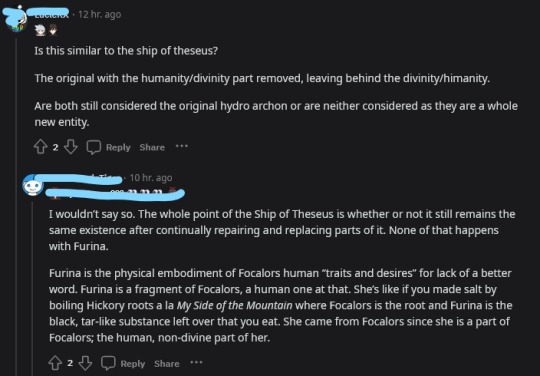
The whole issue, of course, is that some people are tripping over the philosophical question of "what is a person?", others are trying to invent a whole theory of mind, while others are so fully into Christian mythology that they can't conceive of this story not being a reference to their blorbo.
This was, you have to understand, exactly what the writers wanted.
#genshin impact#genshin 4.2 spoilers#the Furina controversy#if you have anymore takes to paste into this discussion please do#but don't expect me to have a side here#I'm just having fun watching
168 notes
·
View notes
Text
What do Shax and a 30-year-old Sandman comic have in common? Puns. The answer is always puns.
While I've recently revealed Shax does actually know how to spell, (she's just really old), the "angle" message Shax throws through the window to demand the "angel" one was a little trickier, because it's not Middle English, or even Old French, it's probably the oldest pun in Good Omens... it's latin.

Good Omens Season 2, Episode 5, 2023
Fortunately, a time travelling Neil Gaiman left answers for us in his 1995 Sandman special "Sandman midnight theatre." See for yourself.

Sandman Midnight Theatre, Neil Gaiman, Matt Wagner, Teddy Kristiansen, 1995
"Still, they have some illuminated manuscripts in their library which throw fascinating light on early church history. "Not angels, but angles" eh? I've been angling for permission to browse through their manuscript collection for yonks."
Appropriate for an English reverend to be curious about "Angels and not Angles". It's THE earliest christian pun, attributed to Pope Gregory the Great in the 6th century CE.
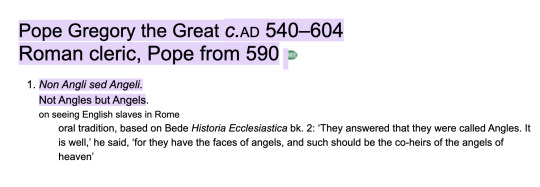
Oxford reference essential quotations
It comes from a historical account of the pope walking through a market in Rome, and seeing some exotic slave children (i.e. fair hair and blue eyes, and light skin) from what is now the England, and asking where they were from. The master replied that they were "Angles" (Angli in latin) and the pope declared them to be "Angels" (Angeli) instead, which, in latin at that time would have been a pun.
This history from Bede actually influenced a lot of the christian world, so we could conceivably make the point that fair blonde and blue eyed angels comes from the idea that they looked liked the English (who were not christian, but pagan at the time of being newly conquered). Aziraphale's looks in the originsl Good Omens are probably a direct result of the lineage in art of this 1,500 year old pun.
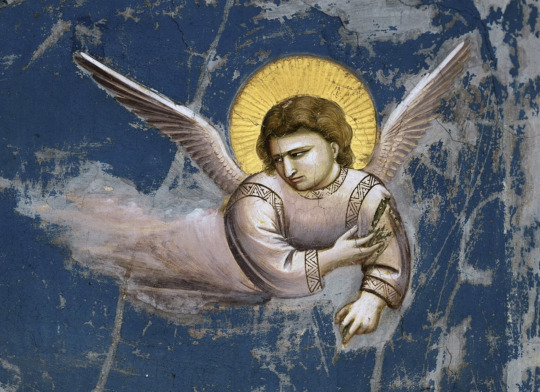
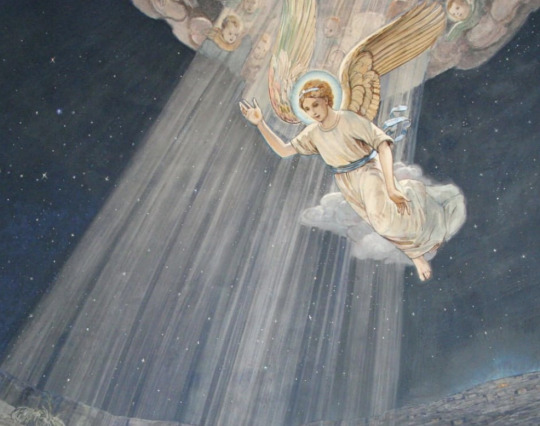
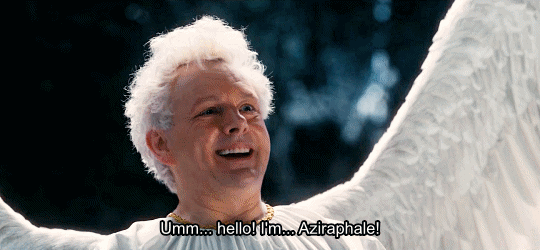
Depictions of angels, 1100 years apart
Which raises the question: if Shax is asking for the Angel Gabriel with her note, the pun doesn't make any fucking sense.
Jon Hamm plays Gabriel as an "American", specifically not English like the rest of the cast. He does have blue eyes, but as far as Shax is concerned, Gabriel's eyes are violet, not really a human colour. Shax could just actually be stupid (I guess?) and not realize that in modern English that constitutes a mistake (boring), or that Americans succeeded in 1776 (hilarious). But here's a quirkier theory: Shax knows what she's talking about, and she's gunning for Maggie.
If you look really closely, demons show up and start hanging around the street earlier in the ball than you would guess. Once a fair number have amassed, they stay waiting for Shax to lead them. However, even though she hasn't shown up yet, they eagerly chase Maggie down the street from her shop. They're only stopped by Crowley, and Maggie gets safely into the ball.

Once inside, she has quite a stunning change of costume, highlighting her blonde hair and blue eyes:

There's so much more evidence to suggest that Maggie isn't really a normal human, but this post is long enough. What I will say is that it's subtle, but once the demon attack really gets going (no thanks to Maggie), Shax and the other demons never look for Jim once, even when he leaves the mezzanine. They concentrate all their efforts on Aziraphale, Maggie and Nina, and never mention Gabriel again.
While Maggie is a Scottish name, and she clearly has some links to Scotland if a random pub in Edinburgh is buying records from her in Soho, she does have a distinctly English accent, and lest we forget...
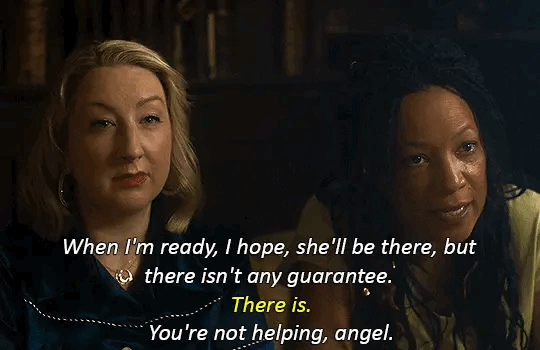
———————————————
thanks as always to @embracing-the-ineffable and @thebluestgreen for the tasty links and sounding board.
#good omens meta#good omens 2#art director talks good omens#go season 2#go meta#good omens season two#good omens season 2#good omens#go2#good omens prime#nina and maggie#anthony j crowley#jimbriel#crowley x aziraphale
88 notes
·
View notes
Note
Do you think they should make a Mormon pioneer American Girl?
Would I personally get a kick out of this? Yes. Do I actually think they should? Probably not.
First of all, pretty much all AG historical dolls have to navigate complex and difficult historical topics at least to some extent. Some have done it more successfully than others. For instance, Felicity was my favorite historical character as a child and I still like her as a character and enjoy her books, but they don't handle slavery well at all. I think creating a book series and a collection that talks about Mormon history in a way that is a) historically accurate and sensitive b) appeals to LDS families, who would likely be the primary audience and overwhelming majority of doll purchasers for this hypothetical character c) maybe even appeals to a broader market would be a really tall order.
Also, assuming that by "Mormon pioneer doll" you mean a character who comes to Utah in one of the first waves of migration in the mid-to-late 1840s or early 1850s, that is very close in era to Kirsten, whose stories begin in 1854, and who is also a frontier settler. There would likely be a lot of overlap between Kirsten's collection and this hypothetical doll's, as well as in the period details in the books. So this begs the question of how much this doll's inclusion would add to the overall AG historical characters canon. Of course, a major focus in Kirsten's books is her immigration story and her Swedish heritage (though, actually, you could write Utah Pioneer Doll as Scandinavian too given how much LDS conversion there was in that region during this period. That would create even more overlap with Kirsten's story, though.) By contrast, a major focus in Hypothetical Utah Pioneer Doll's story would likely be her religion, and this would be something that would be unique to her.
I wouldn't say that AG has shied away entirely from addressing religious faith and practice with their historical dolls. After all, for most of the classic six-book historical character series, the third book is centered around Christmas celebrations (for Rebecca, the focus is on Hanukkah instead and for Kaya her book series is structured differently than those of the other girls and I am not sure there's a holiday book at all.) In terms of the girls whose books I've reread most recently, Addy's church attendance is mentioned frequently in almost all her books and it's probably more thematically central than for most of the other Christian historical characters. Addy's denomination is also explicitly mentioned in the text (her family attends an African Methodist Episcopal church), while for many other characters it is more implicit. (For instance, Felicity is likely Anglican and Kirsten is almost certainly Lutheran, but neither is directly said in text to my knowledge.) It's been more than 15 years since I read Josefina's books, but I remember church attendance being mentioned more prominently in them as well. (Josefina is Catholic, though again I don't remember if this is explicitly stated the text of the stories.) If AG was to create a Mormon historical doll, her religion would have to be explicit and centralized in the text in a way that is very unusual for them.
But not completely unheard of, which brings me to another doll/storyline that is very relevant in this discussion: Rebecca. Rebecca was the first and, for a very long time, the only Jewish doll. The recently added 1990s twins are also Jewish, though it sounds like religion is comparatively deemphasized in their books, and they're much more secular. (This is a pattern with the more recent historical dolls, by which I mean both the ones created more recently and the ones whose stories are set in the more recent historical past.) I think Rebecca is the character for whom religion is the most prominent in her story (though, of course, because Judaism is an ethno-religion her stories address both her ethnic heritage and religious traditions in tandem, which makes it feel even more central.) She was also (again, until the twins were created) the only historical character who is a member of a religious minority in both a modern and historical sense. That is, in Rebecca's era Jewish Americans were a religious minority and they still are today. I think you could argue that as a Native American Kaya is sort of also a religious minority but I don't think that makes sense in the context of her time. For Catholic historical characters (Josefina, Cecile, and Marie-Grace), I think Catholics were a religious minority in the 19th century but given that it's currently the largest Christian denomination in the country that is no longer applicable. (Also, all three of those characters live in regions and eras where Catholics are the majority. I suppose if we count Best Friend dolls, the presumably-Catholic Irish Nellie is the only doll who would have lived in a context where Catholics were in fact a religious minority.)
Obviously, Mormons are Christians--or not so obviously, I suppose, given that a lot of other Christian denominations do not think they are. But they believe they are a Christian denomination, and I think that matters. Whereas obviously Jewish people are a religious minority in the sense that they are very much not Christians. But I do think Mormons were in the past and continue to be a religious minority (and the fact that they have historically troubled the boundaries of Christianity and been excluded from that by a lot of more mainstream Christians definitely contributes to that.) In the modern day, the statistics in terms of percentage of the American population are similar to Judaism, actually. There are slightly fewer Mormon Americans, about 1.5-2 percent of the population, whereas Jewish Americans are about 2-2.5 percent (though this includes people who identify as Jewish but not religiously observant.)
I feel like I'm rambling here, sorry. The point I was trying to make is that with Rebecca we do have an example of a historical doll who is a member of a (both historical and contemporary) religious minority and that minority is of relatively comparable size to Mormonism. Though I think in some ways a Jewish historical doll might be a more likely purchase for non-Jewish families than a Mormon historical doll would be for non-Mormons? I don't know if I can necessarily articulate why, though. Just a feeling. In terms of other differences I can't necessarily articulate--when Rebecca was released, having a historical character who was an Eastern European Jewish immigrant to New York City in the early 1900s felt like almost an obvious choice, as well as a necessary one. And if Rebecca hadn't been introduced, not having a Jewish historical doll would feel like a major oversight. On the contrary, if AG announced a Mormon historical doll I would be genuinely shocked. Like, knock me over with a feather shocked. I also don't feel like the lack of inclusion is a huge oversight in the way that not having a Jewish doll would be. (And, frankly, in the way the fact that they still don't have an Asian American historical doll is).
That being said, I definitely don't want to portray Mormonism as entirely inconsequential or peripheral to American history, as I don't believe it is. Mormonism is by far the largest religious tradition that originated in America and I think it overlays in really interesting ways with broader American historical issues like Westward expansion as well as issues around race, gender, religious freedom, and the boundaries of citizenship. I do think that a Mormon AG doll could potentially be very interesting. I also think it would be controversial and difficult to do well (by whatever standard "doing well" would be.)
#THIS GOT DELETED WHEN MY COMPUTER CRASHED HALFWAY THROUGH SORRY#i had to rewrite the first half i hope it's not too confusing
33 notes
·
View notes
Note
Well can you explain Gender Ideology with who uses it and where? Can you show where I can find it? Can you describe it without conspiracy theory or recycled homophobia? You are welcome to try.
So I think some of the confusion might come from the language. I know you’re being facetious with this comment but anyway. I am literally a gender studies major so this will probably be more in depth than what you’re asking but maybe someone can benefit.
Gender Ideology™️ isn’t some sort of official concept and doesn’t have an agreed upon definition or foundational text like other social theories. It’s a way of conceptualizing sex and gender. Other analogous frameworks would be biblical gender roles, the Christian fundamentalist ideas of men and women, or postmodernist queer theory, something like Butler’s Gender Performativity.
You’re right that gender ideology is vague and non-specific and I think this is because of the interaction between academia, politics, medicine, and popular culture. Sure, academics and theorists influence society, but rarely in such a direct way (please feel free to correct me). For example, the American civil rights movement and women’s liberation movement had academic elements, but were not governed by how academics theorized race and sex, they were based on people’s lived experiences. Transgenderism, I think, is the opposite and somewhat of an escaped lab experiment. Towards the end of the 20th century, academics began to write about gender in more provocative and philosophical ways. Obviously, this was not the first time anyone had done this, but there was a huge shift in the way academic spaces thought about gender in the US after women achieved full legal rights (which didn’t happen until the 1970s btw). I’m sure the fact that women and gays/lesbians could finally be scholars and professors was important as well. Anyway, I might disagree with Butler, but her theory work is at least intellectually robust. And if you read Butler, it’s very obvious that she is first and foremost a philosopher, not a sociologist or an anthropologist, and this is clear when you hear her speak (which I’ve done btw). Contemporary transgenderism, as a social category, is a direct result of these theorists. There is a lot of misrepresenting or even rewriting history but “transgender” as we understand it today did not exist 20 years ago. We like to call people like Marsha P Johnson transgender, but he didn’t identify that way. He called himself a gay man, a cross dresser, a drag queen, a transvestite etc etc. TRAs often say “trans people have always existed” and homosexual behavior and gender nonconformity (and maybe even sex dysphoria) have always existed but trans as a concept undeniably has not. I could talk a lot more about historical falsehoods and Transgenderism but for the sake of getting to the point I’ll move on for now.
Gender ideology, is how groups like radfems refer to the Frankenstein monstrosity that is the framework Western left/progressives use today to think about gender and sex in order to be inclusive to transgender identifying people. The main ideas are that biological sex is not real and neither is sex-based oppression. It maintains that social and medical transition is necessary for transgender people to live, and that medicine is able to change someone’s biological sex (it can’t). Being transgender is not just dysphoria but some innate sense that someone’s soul is differently gendered than their biological sex (except biological sex is also somehow not real, one of many paradoxes). A woman is “someone who identifies a woman,” even though this phrase is completely meaningless. Because gender is not tied to biology sex, it relies on social ideas. As a result, gender ideology reinforces regressive gender roles and stereotypes, without which it cannot exist. 20 years ago we said boys can play with dolls and it doesn’t mean they’re gay because gender stereotypes aren’t innate and are very harmful, today “we” say that boys who play with dolls are actually girls and need to be given a pink makeover and put on medication. While society was beginning to move away from gender, gender ideology has brought it back to the center and gender is once again considered to be central to one’s identity (and personality) and maybe even the most important fact about them. For this reason “misgendering” and similar actions are considered violent attacks on personhood. Crucially, gender ideology converges with conservative gender ideals through its obsession with gender and performing femininity and masculinity.
#rad fem#rad fem safe#radical feminism#radical feminst#radical feminist safe#terfsafe#radblr#terfblr#radical feminists please interact#radical feminists do touch
77 notes
·
View notes
Text
Was Jesus transgender?

Jay Hulme has written a fascinating thread about how theologians have understood the gender of Jesus. Even though no one thinks of Jesus as transgender in the modern sense, it is pretty clear that Jesus has been seen as crossing the gender binary.
Jay Hulme is a transgender poet, performer and education and you can find his web site here! Jay is currently Poet-in-Residence at ‘The Poet’s Church’, St Giles-in-the-Fields in Central London.

Recently there was some drama where news outlets got angry at a sermon which supposedly claimed Jesus was trans. Obviously the sermon did not say Jesus was trans - but it did touch on some fascinating (and very old) theology surrounding Jesus and gender. So let's talk about that.
God is not male
First I've gotta explain the Trinity... which is way too complex for twitter Suffice to say that God is not male (despite what you may have heard) and is in fact all genders and none simultaneously Jesus is God made flesh, God embodied as human. As a human man, yes, but also...
If you've been on Trans Twitter you'll have seen the "Jesus is trans" jokes. Saying his chromosomes had to be XX because he couldn't have got a Y from his Father. The meme about his side would being from top surgery But people have been playing with Jesus' gender for centuries
And the reason that people have been playing with Jesus' gender in art and theology and all that for centuries, is that Jesus gives us REASON to. So, of course, as we expand our understanding of gender in the modern world, we expand that to trans stuff too.
For all mankind
So lets talk about how, historically, the "Masculinity" of Jesus has been seen and considered, shall we?
So the whole point of Jesus is that he comes for ALL of humankind. We are told that we are all capable of, and supposed to work towards, being "christlike" - after all, Jesus is the embodiment of a genderless (or genderfull) God. The point is not that Jesus is a man, but a HUMAN.
And Jesus is clear about the fact that he didn't come as "a man" but "a human". So clear that all of the Gospel writers agree on it. In fact, throughout the Gospels Jesus never uses the word "anēr" (male/masculine) to describe himself. He always uses "anthrōpos" (human).
Jesus is the human incarnation of a God who is all genders and none, all at the same time; a God that has created each of us in their own image - all of us, of every gender - and therefore Jesus is not simply "male", but "human", and theologians have long recognised this.
Jesus as mother
Understanding that Jesus isn't merely "male", theologians have often described Jesus as a "mother" - most famously Julian of Norwich, who wrote in the 1300's, said: "Jesus Christ therefore, who himself overcame evil with good, is our true Mother."
Julian of Norwich also stated "The mother can give her child to suck of her milk, but our precious Mother Jesus can feed us with himself, and does, most courteously and most tenderly, with the blessed sacrament, which is the precious food of true life"
This idea of the sacrament as breast milk was not unique to Julian - many theologians drew the connection between these life giving things - even reflecting Rabbinic understandings of the Manna from Heaven as breast milk to create a long thread of understanding.
But one of the most "contentious" parts of the sermon that started this furore and started this thread is a particular (and long held) understanding of Jesus' side wound. Obviously, Julian has thoughts on that, too...
Julian says: "The mother can lay her child tenderly to her breast, but our tender Mother Jesus can lead us easily into his blessed breast through his sweet open side, and show us there a part of the godhead and of the joys of heaven, with inner certainty of endless bliss."
Jesus side wound
Medieval Christians were OBSESSED with Jesus' side wound. It was the highlight of artistic depictions, the focus of sermons, the content of visions. And one of the main things they saw it as, was some kind of portal...
And by "portal", I do, of course, mean vagina. And that's what the oh so contentious sermon said - "look, medieval christian art saw Jesus' side wound as a vagina. Let's talk about that."
The idea is that Jesus gives life. Like a mother giving birth. Jesus raising Lazarus from the tomb, Jesus himself rising from the tomb, they both involve the miraculous drawing out of human life from a dark cave, along a tunnel, and into the light. Sounds a lot like childbirth.
We say that Christ died so that we could live. The Bible says it a lot. Many theologians, living in a time where death in childbirth was common, and childbirth itself could be horrifically painful drew the connection between Christ's physical death on the cross and childbirth.
Theologians saw Jesus' agony on the cross as a form of 'labour' as he 'birthed' new life for all of us. And so, when the soldier pieced his side, proving he was dead, and "blood and water" came out, they saw that as the moment of 'birth'. Like blood and water come in childbirth
With that in mind, when an opening in a body brings forth water and blood, and in the midst of that water and blood comes new life... it's fair to think of it as a vagina. So medieval artists, depicting that moment, depicted Jesus' side wound as such. It was a thing.
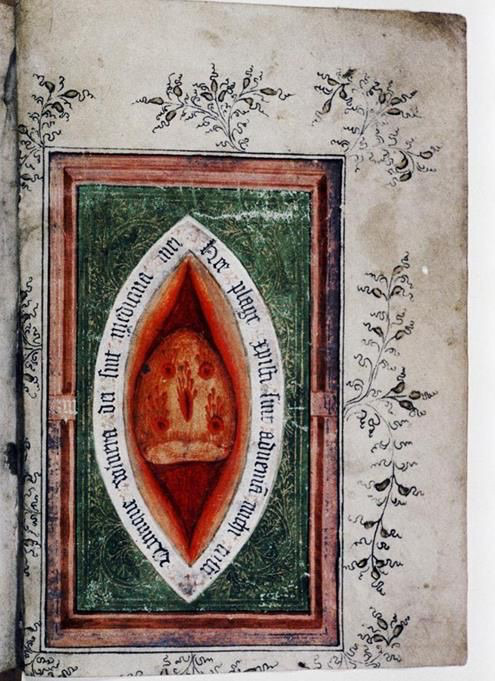
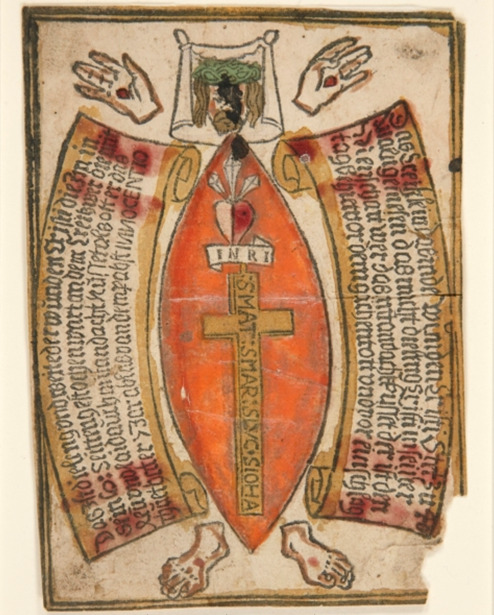
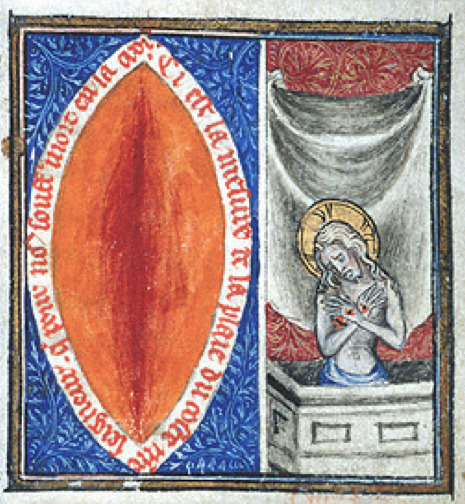
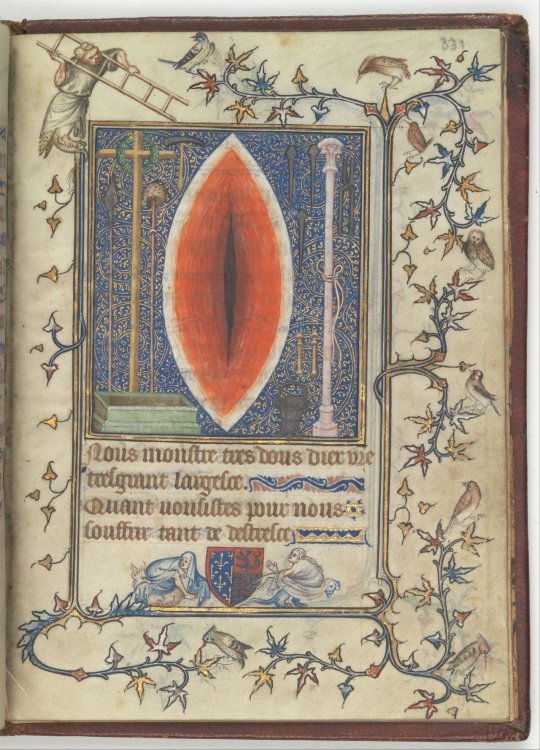
The femininity of Jesus
There's also all the theology that surrounded Jesus' actions: theologians living in times of strict gender roles obsessed over the "femininity" of Jesus feeding and serving others. Even speaking to women as if they were equal. Of him taking the "feminine role" in his interactions
But this thread is already very long...
In summary: If you think it's heresy to see Jesus as "feminine" or "mother" or anything other than a masculine macho manly man, you're wrong. And if you think it's "modern woke nonsense", then you've not been paying attention to centuries of theology, or the Gospels themselves.
One day I'll do a whole thread on how it actually is Big Trans Vibes for God to shrink down to a single "gender" and body to walk among us as Jesus, and how weird that must have been for Jesus to suddenly be "male" and not "the genderweird vibe of God" but that's for another time
Ppl have been going BUT WHAT ABOUT 'THE SON OF MAN' and my friends, the earliest Gospels we've got are Ancient Greek and Luke 9:22 says "υἱός τοῦ ἀνθρώπου" υἱός is often translated as "male child" but regularly applies to female children ἀνθρώπου means "human / humanity"
Full twitter thread here!
Photo from the Norwegian play Jesus, the Queen of Heaven, where the Norwegian transgender pioneer Esben Esther Pirelli Benestad played Jesus. Photo by Fin Serck-Hanssen.
#trans#transgender#queer#lgbt#lgbtqa#jesus#theology#gender theology#christianity#essential#history#religion
738 notes
·
View notes